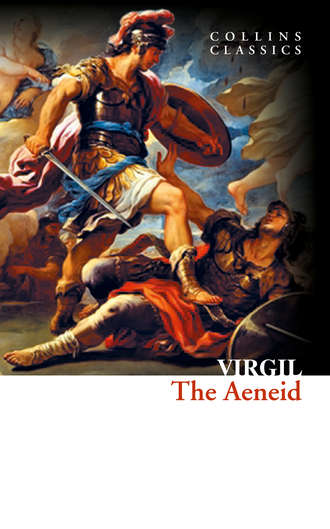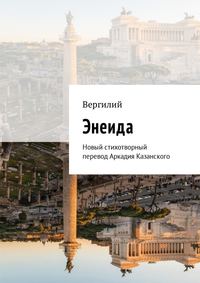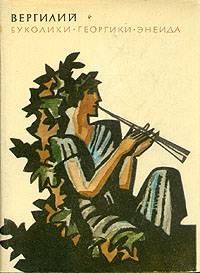
Полная версия
The Aeneid
Me, then a boy, my father, poor and bare
Of other means, committed to his care,
His kinsman and companion in the war.
While Fortune favor’d, while his arms support
The cause, and rul’d the counsels, of the court,
I made some figure there; nor was my name
Obscure, nor I without my share of fame.
But when Ulysses, with fallacious arts,
Had made impression in the people’s hearts,
And forg’d a treason in my patron’s name
(I speak of things too far divulg’d by fame),
My kinsman fell. Then I, without support,
In private mourn’d his loss, and left the court.
Mad as I was, I could not bear his fate
With silent grief, but loudly blam’d the state,
And curs’d the direful author of my woes.
’Twas told again; and hence my ruin rose.
I threaten’d, if indulgent Heav’n once more
Would land me safely on my native shore,
His death with double vengeance to restore.
This mov’d the murderer’s hate; and soon ensued
Th’ effects of malice from a man so proud.
Ambiguous rumors thro’ the camp he spread,
And sought, by treason, my devoted head;
New crimes invented; left unturn’d no stone,
To make my guilt appear, and hide his own;
Till Calchas was by force and threat’ning wrought-
But why—why dwell I on that anxious thought?
If on my nation just revenge you seek,
And ’tis t’appear a foe, t’appear a Greek;
Already you my name and country know;
Assuage your thirst of blood, and strike the blow:
My death will both the kingly brothers please,
And set insatiate Ithacus at ease.’
This fair unfinish’d tale, these broken starts,
Rais’d expectations in our longing hearts:
Unknowing as we were in Grecian arts.
His former trembling once again renew’d,
With acted fear, the villain thus pursued:
“‘Long had the Grecians (tir’d with fruitless care,
And wearied with an unsuccessful war)
Resolv’d to raise the siege, and leave the town;
And, had the gods permitted, they had gone;
But oft the wintry seas and southern winds
Withstood their passage home, and chang’d their minds.
Portents and prodigies their souls amaz’d;
But most, when this stupendous pile was rais’d:
Then flaming meteors, hung in air, were seen,
And thunders rattled thro’ a sky serene.
Dismay’d, and fearful of some dire event,
Eurypylus t’ enquire their fate was sent.
He from the gods this dreadful answer brought:
“O Grecians, when the Trojan shores you sought,
Your passage with a virgin’s blood was bought:
So must your safe return be bought again,
And Grecian blood once more atone the main.”
The spreading rumor round the people ran;
All fear’d, and each believ’d himself the man.
Ulysses took th’ advantage of their fright;
Call’d Calchas, and produc’d in open sight:
Then bade him name the wretch, ordain’d by fate
The public victim, to redeem the state.
Already some presag’d the dire event,
And saw what sacrifice Ulysses meant.
For twice five days the good old seer withstood
Th’ intended treason, and was dumb to blood,
Till, tir’d, with endless clamors and pursuit
Of Ithacus, he stood no longer mute;
But, as it was agreed, pronounc’d that I
Was destin’d by the wrathful gods to die.
All prais’d the sentence, pleas’d the storm should fall
On one alone, whose fury threaten’d all.
The dismal day was come; the priests prepare
Their leaven’d cakes, and fillets for my hair.
I follow’d nature’s laws, and must avow
I broke my bonds and fled the fatal blow.
Hid in a weedy lake all night I lay,
Secure of safety when they sail’d away.
But now what further hopes for me remain,
To see my friends, or native soil, again;
My tender infants, or my careful sire,
Whom they returning will to death require;
Will perpetrate on them their first design,
And take the forfeit of their heads for mine?
Which, O! if pity mortal minds can move,
If there be faith below, or gods above,
If innocence and truth can claim desert,
Ye Trojans, from an injur’d wretch avert.’
“False tears true pity move; the king commands
To loose his fetters, and unbind his hands:
Then adds these friendly words: ‘Dismiss thy fears;
Forget the Greeks; be mine as thou wert theirs.
But truly tell, was it for force or guile,
Or some religious end, you rais’d the pile?’
Thus said the king. He, full of fraudful arts,
This well-invented tale for truth imparts:
‘Ye lamps of heav’n!’ he said, and lifted high
His hands now free, ‘thou venerable sky!
Inviolable pow’rs, ador’d with dread!
Ye fatal fillets, that once bound this head!
Ye sacred altars, from whose flames I fled!
Be all of you adjur’d; and grant I may,
Without a crime, th’ ungrateful Greeks betray,
Reveal the secrets of the guilty state,
And justly punish whom I justly hate!
But you, O king, preserve the faith you gave,
If I, to save myself, your empire save.
The Grecian hopes, and all th’ attempts they made,
Were only founded on Minerva’s aid.
But from the time when impious Diomede,
And false Ulysses, that inventive head,
Her fatal image from the temple drew,
The sleeping guardians of the castle slew,
Her virgin statue with their bloody hands
Polluted, and profan’d her holy bands;
From thence the tide of fortune left their shore,
And ebb’d much faster than it flow’d before:
Their courage languish’d, as their hopes decay’d;
And Pallas, now averse, refus’d her aid.
Nor did the goddess doubtfully declare
Her alter’d mind and alienated care.
When first her fatal image touch’d the ground,
She sternly cast her glaring eyes around,
That sparkled as they roll’d, and seem’d to threat:
Her heav’nly limbs distill’d a briny sweat.
Thrice from the ground she leap’d, was seen to wield
Her brandish’d lance, and shake her horrid shield.
Then Calchas bade our host for flight
And hope no conquest from the tedious war,
Till first they sail’d for Greece; with pray’rs besought
Her injur’d pow’r, and better omens brought.
And now their navy plows the wat’ry main,
Yet soon expect it on your shores again,
With Pallas pleas’d; as Calchas did ordain.
But first, to reconcile the blue-ey’d maid
For her stol’n statue and her tow’r betray’d,
Warn’d by the seer, to her offended name
We rais’d and dedicate this wondrous frame,
So lofty, lest thro’ your forbidden gates
It pass, and intercept our better fates:
For, once admitted there, our hopes are lost;
And Troy may then a new Palladium boast;
For so religion and the gods ordain,
That, if you violate with hands profane
Minerva’s gift, your town in flames shall burn,
(Which omen, O ye gods, on Graecia turn!)
But if it climb, with your assisting hands,
The Trojan walls, and in the city stands;
Then Troy shall Argos and Mycenae burn,
And the reverse of fate on us return.’
“With such deceits he gain’d their easy hearts,
Too prone to credit his perfidious arts.
What Diomede, nor Thetis’ greater son,
A thousand ships, nor ten years’ siege, had done—
False tears and fawning words the city won.
“A greater omen, and of worse portent,
Did our unwary minds with fear torment,
Concurring to produce the dire event.
Laocoon, Neptune’s priest by lot that year,
With solemn pomp then sacrific’d a steer;
When, dreadful to behold, from sea we spied
Two serpents, rank’d abreast, the seas divide,
And smoothly sweep along the swelling tide.
Their flaming crests above the waves they show;
Their bellies seem to burn the seas below;
Their speckled tails advance to steer their course,
And on the sounding shore the flying billows force.
And now the strand, and now the plain they held;
Their ardent eyes with bloody streaks were fill’d;
Their nimble tongues they brandish’d as they came,
And lick’d their hissing jaws, that sputter’d flame.
We fled amaz’d; their destin’d way they take,
And to Laocoon and his children make;
And first around the tender boys they wind,
Then with their sharpen’d fangs their limbs and bodies grind.
The wretched father, running to their aid
With pious haste, but vain, they next invade;
Twice round his waist their winding volumes roll’d;
And twice about his gasping throat they fold.
The priest thus doubly chok’d, their crests divide,
And tow’ring o’er his head in triumph ride.
With both his hands he labors at the knots;
His holy fillets the blue venom blots;
His roaring fills the flitting air around.
Thus, when an ox receives a glancing wound,
He breaks his bands, the fatal altar flies,
And with loud bellowings breaks the yielding skies.
Their tasks perform’d, the serpents quit their prey,
And to the tow’r of Pallas make their way:
Couch’d at her feet, they lie protected there
By her large buckler and protended spear.
Amazement seizes all; the gen’ral cry
Proclaims Laocoon justly doom’d to die,
Whose hand the will of Pallas had withstood,
And dared to violate the sacred wood.
All vote t’ admit the steed, that vows be paid
And incense offer’d to th’ offended maid.
A spacious breach is made; the town lies bare;
Some hoisting-levers, some the wheels prepare
And fasten to the horse’s feet; the rest
With cables haul along th’ unwieldly beast.
Each on his fellow for assistance calls;
At length the fatal fabric mounts the walls,
Big with destruction. Boys with chaplets crown’d,
And choirs of virgins, sing and dance around.
Thus rais’d aloft, and then descending down,
It enters o’er our heads, and threats the town.
O sacred city, built by hands divine!
O valiant heroes of the Trojan line!
Four times he struck: as oft the clashing sound
Of arms was heard, and inward groans rebound.
Yet, mad with zeal, and blinded with our fate,
We haul along the horse in solemn state;
Then place the dire portent within the tow’r.
Cassandra cried, and curs’d th’ unhappy hour;
Foretold our fate; but, by the god’s decree,
All heard, and none believ’d the prophecy.
With branches we the fanes adorn, and waste,
In jollity, the day ordain’d to be the last.
Meantime the rapid heav’ns roll’d down the light,
And on the shaded ocean rush’d the night;
Our men, secure, nor guards nor sentries held,
But easy sleep their weary limbs compell’d.
The Grecians had embark’d their naval pow’rs
From Tenedos, and sought our well-known shores,
Safe under covert of the silent night,
And guided by th’ imperial galley’s light;
When Sinon, favor’d by the partial gods,
Unlock’d the horse, and op’d his dark abodes;
Restor’d to vital air our hidden foes,
Who joyful from their long confinement rose.
Lysander bold, and Sthenelus their guide,
And dire Ulysses down the cable slide:
Then Thoas, Athamas, and Pyrrhus haste;
Nor was the Podalirian hero last,
Nor injur’d Menelaus, nor the fam’d
Epeus, who the fatal engine fram’d.
A nameless crowd succeed; their forces join
T’ invade the town, oppress’d with sleep and wine.
Those few they find awake first meet their fate;
Then to their fellows they unbar the gate.
“’Twas in the dead of night, when sleep repairs
Our bodies worn with toils, our minds with cares,
When Hector’s ghost before my sight appears:
A bloody shroud he seem’d, and bath’d in tears;
Such as he was, when, by Pelides slain,
Thessalian coursers dragg’d him o’er the plain.
Swoln were his feet, as when the thongs were thrust
Thro’ the bor’d holes; his body black with dust;
Unlike that Hector who return’d from toils
Of war, triumphant, in Aeacian spoils,
Or him who made the fainting Greeks retire,
And launch’d against their navy Phrygian fire.
His hair and beard stood stiffen’d with his gore;
And all the wounds he for his country bore
Now stream’d afresh, and with new purple ran.
I wept to see the visionary man,
And, while my trance continued, thus began:
‘O light of Trojans, and support of Troy,
Thy father’s champion, and thy country’s joy!
O, long expected by thy friends! from whence
Art thou so late return’d for our defense?
Do we behold thee, wearied as we are
With length of labors, and with toils of war?
After so many fun’rals of thy own
Art thou restor’d to thy declining town?
But say, what wounds are these? What new disgrace
Deforms the manly features of thy face?’
“To this the specter no reply did frame,
But answer’d to the cause for which he came,
And, groaning from the bottom of his breast,
This warning in these mournful words express’d:
‘O goddess-born! escape, by timely flight,
The flames and horrors of this fatal night.
The foes already have possess’d the wall;
Troy nods from high, and totters to her fall.
Enough is paid to Priam’s royal name,
More than enough to duty and to fame.
If by a mortal hand my father’s throne
Could be defended, ’twas by mine alone.
Now Troy to thee commends her future state,
And gives her gods companions of thy fate:
From their assistance walls expect,
Which, wand’ring long, at last thou shalt erect.’
He said, and brought me, from their blest abodes,
The venerable statues of the gods,
With ancient Vesta from the sacred choir,
The wreaths and relics of th’ immortal fire.
“Now peals of shouts come thund’ring from afar,
Cries, threats, and loud laments, and mingled war:
The noise approaches, tho’ our palace stood
Aloof from streets, encompass’d with a wood.
Louder, and yet more loud, I hear th’ alarms
Of human cries distinct, and clashing arms.
Fear broke my slumbers; I no longer stay,
But mount the terrace, thence the town survey,
And hearken what the frightful sounds convey.
Thus, when a flood of fire by wind is borne,
Crackling it rolls, and mows the standing corn;
Or deluges, descending on the plains,
Sweep o’er the yellow year, destroy the pains
Of lab’ring oxen and the peasant’s gains;
Unroot the forest oaks, and bear away
Flocks, folds, and trees, and undistinguish’d prey:
The shepherd climbs the cliff, and sees from far
The wasteful ravage of the wat’ry war.
Then Hector’s faith was manifestly clear’d,
And Grecian frauds in open light appear’d.
The palace of Deiphobus ascends
In smoky flames, and catches on his friends.
Ucalegon burns next: the seas are bright
With splendor not their own, and shine with Trojan light.
New clamors and new clangors now arise,
The sound of trumpets mix’d with fighting cries.
With frenzy seiz’d, I run to meet th’ alarms,
Resolv’d on death, resolv’d to die in arms,
But first to gather friends, with them t’ oppose
(If fortune favor’d) and repel the foes;
Spurr’d by my courage, by my country fir’d,
With sense of honor and revenge inspir’d.
“Pantheus, Apollo’s priest, a sacred name,
Had scap’d the Grecian swords, and pass’d the flame:
With relics loaden. to my doors he fled,
And by the hand his tender grandson led.
‘What hope, O Pantheus? whither can we run?
Where make a stand? and what may yet be done?’
Scarce had I said, when Pantheus, with a groan:
‘Troy is no more, and Ilium was a town!
The fatal day, th’ appointed hour, is come,
When wrathful Jove’s irrevocable doom
Transfers the Trojan state to Grecian hands.
The fire consumes the town, the foe commands;
And armed hosts, an unexpected force,
Break from the bowels of the fatal horse.
Within the gates, proud Sinon throws about
The flames; and foes for entrance press without,
With thousand others, whom I fear to name,
More than from Argos or Mycenae came.
To sev’ral posts their parties they divide;
Some block the narrow streets, some scour the wide:
The bold they kill, th’ unwary they surprise;
Who fights finds death, and death finds him who flies.
The warders of the gate but scarce maintain
Th’ unequal combat, and resist in vain.’
“I heard; and Heav’n, that well-born souls inspires,
Prompts me thro’ lifted swords and rising fires
To run where clashing arms and clamor calls,
And rush undaunted to defend the walls.
Ripheus and Iph’itus by my side engage,
For valor one renown’d, and one for age.
Dymas and Hypanis by moonlight knew
My motions and my mien, and to my party drew;
With young Coroebus, who by love was led
To win renown and fair Cassandra’s bed,
And lately brought his troops to Priam’s aid,
Forewarn’d in vain by the prophetic maid.
Whom when I saw resolv’d in arms to fall,
And that one spirit animated all:
‘Brave souls!’ said I,—‘but brave, alas! in vain—
Come, finish what our cruel fates ordain.
You see the desp’rate state of our affairs,
And heav’n’s protecting pow’rs are deaf to pray’rs.
The passive gods behold the Greeks defile
Their temples, and abandon to the spoil
Their own abodes: we, feeble few, conspire
To save a sinking town, involv’d in fire.
Then let us fall, but fall amidst our foes:
Despair of life the means of living shows.’
So bold a speech incourag’d their desire
Of death, and added fuel to their fire.
“As hungry wolves, with raging appetite,
Scour thro’ the fields, nor fear the stormy night—
Their whelps at home expect the promis’d food,
And long to temper their dry chaps in blood—
So rush’d we forth at once; resolv’d to die,
Resolv’d, in death, the last extremes to try.
We leave the narrow lanes behind, and dare
Th’ unequal combat in the public square:
Night was our friend; our leader was despair.
What tongue can tell the slaughter of that night?
What eyes can weep the sorrows and affright?
An ancient and imperial city falls:
The streets are fill’d with frequent funerals;
Houses and holy temples float in blood,
And hostile nations make a common flood.
Not only Trojans fall; but, in their turn,
The vanquish’d triumph, and the victors mourn.
Ours take new courage from despair and night:
Confus’d the fortune is, confus’d the fight.
All parts resound with tumults, plaints, and fears;
And grisly Death in sundry shapes appears.
Androgeos fell among us, with his band,
Who thought us Grecians newly come to land.
‘From whence,’ said he, ‘my friends, this long delay?
You loiter, while the spoils are borne away:
Our ships are laden with the Trojan store;
And you, like truants, come too late ashore.’
He said, but soon corrected his mistake,
Found, by the doubtful answers which we make:
Amaz’d, he would have shunn’d th’ unequal fight;
But we, more num’rous, intercept his flight.
As when some peasant, in a bushy brake,
Has with unwary footing press’d a snake;
He starts aside, astonish’d, when he spies
His rising crest, blue neck, and rolling eyes;
So from our arms surpris’d Androgeos flies.
In vain; for him and his we compass’d round,
Possess’d with fear, unknowing of the ground,
And of their lives an easy conquest found.
Thus Fortune on our first endeavor smil’d.
Coroebus then, with youthful hopes beguil’d,
Swoln with success, and a daring mind,
This new invention fatally design’d.
‘My friends,’ said he, ‘since Fortune shows the way,
’Tis fit we should th’ auspicious guide obey.
For what has she these Grecian arms bestow’d,
But their destruction, and the Trojans’ good?
Then change we shields, and their devices bear:
Let fraud supply the want of force in war.
They find us arms.’ This said, himself he dress’d
In dead Androgeos’ spoils, his upper vest,
His painted buckler, and his plumy crest.
Thus Ripheus, Dymas, all the Trojan train,
Lay down their own attire, and strip the slain.
Mix’d with the Greeks, we go with ill presage,
Flatter’d with hopes to glut our greedy rage;
Unknown, assaulting whom we blindly meet,
And strew with Grecian carcasses the street.
Thus while their straggling parties we defeat,
Some to the shore and safer ships retreat;
And some, oppress’d with more ignoble fear,
Remount the hollow horse, and pant in secret there.
“But, ah! what use of valor can be made,
When heav’n’s propitious pow’rs refuse their aid!
Behold the royal prophetess, the fair
Cassandra, dragg’d by her dishevel’d hair,
Whom not Minerva’s shrine, nor sacred bands,
In safety could protect from sacrilegious hands:
On heav’n she cast her eyes, she sigh’d, she cried—
’Twas all she could—her tender arms were tied.
So sad a sight Coroebus could not bear;
But, fir’d with rage, distracted with despair,
Amid the barb’rous ravishers he flew:
Our leader’s rash example we pursue.
But storms of stones, from the proud temple’s height,
Pour down, and on our batter’d helms alight:
We from our friends receiv’d this fatal blow,
Who thought us Grecians, as we seem’d in show.
They aim at the mistaken crests, from high;
And ours beneath the pond’rous ruin lie.
Then, mov’d with anger and disdain, to see
Their troops dispers’d, the royal virgin free,
The Grecians rally, and their pow’rs unite,
With fury charge us, and renew the fight.
The brother kings with Ajax join their force,
And the whole squadron of Thessalian horse.
“Thus, when the rival winds their quarrel try,
Contending for the kingdom of the sky,
South, east, and west, on airy coursers borne;
The whirlwind gathers, and the woods are torn:
Then Nereus strikes the deep; the billows rise,
And, mix’d with ooze and sand, pollute the skies.
The troops we squander’d first again appear








